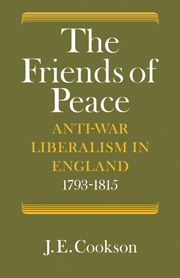Book contents
Summary
The Christian petitions of 1812–13 were the last public protest of the Friends of Peace. As the end of the war loomed with the alliances and campaigns of 1813 and 1814, their dominant concern became the terms of peace, particularly that the victorious allies should refrain from seizing French territory and from forcing a government on the French people. Theirs was a realisation that the Revolution yet needed defending. Events had so worked out that the situation of 1792–3 had been recreated twenty years later. In both cases France stood alone against a coalition of European powers which would not or could not guarantee that its action would stop short of the total overthrow of the Revolution. In the Hundred Days of 1815 the repetition was almost exact, for the Allies went to war avowing the destruction of the Napoleonic regime and the restoration of the Bourbons. ‘It is vain’, wrote Horner, ‘to consider the present as any other than a renewal of the old coalition of 1793 against the objects of the French in their revolution; it differs from that war only in this, that the coalition of the despots is more formidable, and that the French are without the defensive enthusiasm arising from the possession or the near prospect of liberty. The success of the allies will probably be fatal to the freedom of the world, for an age to follow.’
Horner as a Whig MP relived the past no less than the liberals did in 1813–15.
- Type
- Chapter
- Information
- The Friends of PeaceAnti-War Liberalism in England 1793–1815, pp. 255 - 261Publisher: Cambridge University PressPrint publication year: 1982

